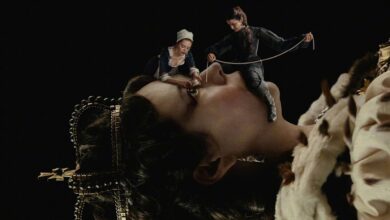Opus Film Review: The Border Between Monster and Genius | A24 Movie
Opus Film Review: The first striking feature of Opus is how it confirms the existence of a horror model, or perhaps of films in full “in the manner of A24”. It will be because, at this point, the beloved American film production company of the film buffs has presented dozens of indie films, and therefore, we have understood their preferences; it will be because the horror genre is among the favorites in the list of its price list. The fact remains that we have reached the point that we can sit in the room, see a film, and think: “Eh yes, it is an A24 film”. We forgive genes for everything. Almost. In the name of art, historically, genes or presumed such have been granted the benefit of the doubt even in the face of evidence, and when there was no evidence, the genius got away with it. The point is that we are used to attributing the status of “genius” not only to people who have proven to be exceptional in their field – art, literature, sport – but also to whom, in the name of a certain eccentricity, that status has sought and obtained also thanks to its arrogance.
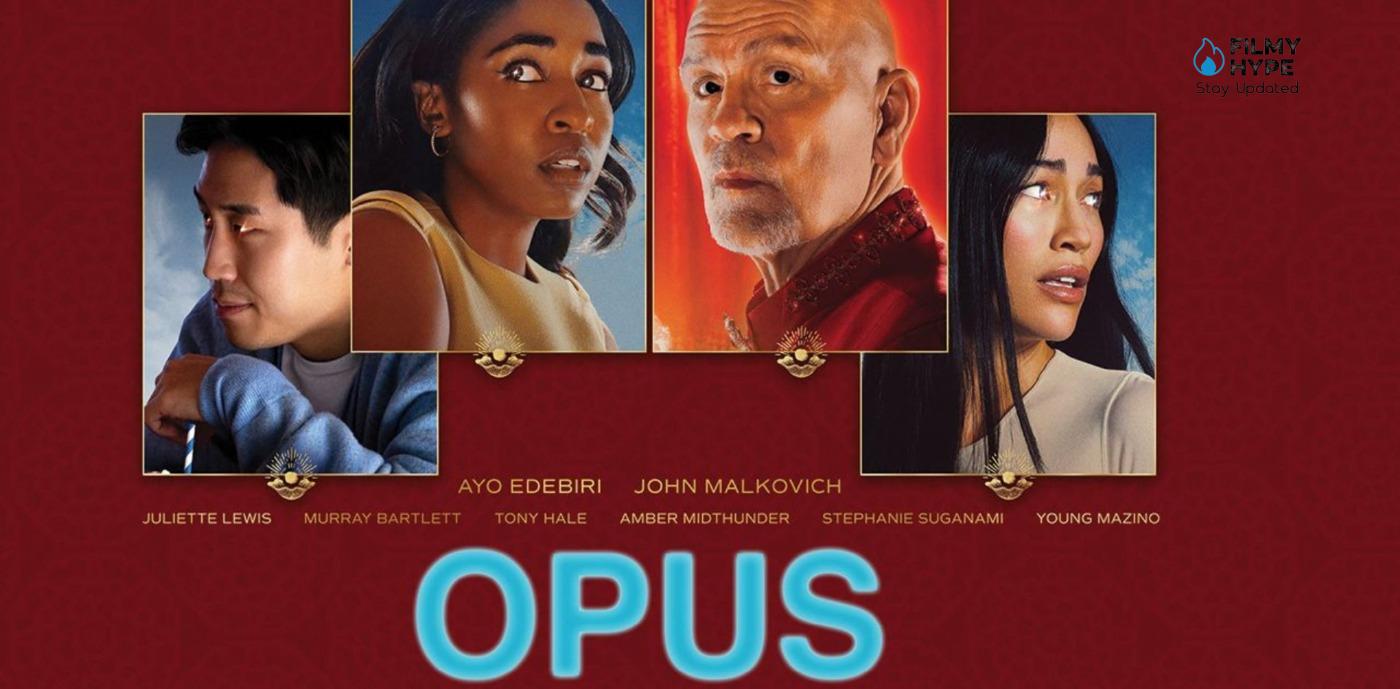
If Opus had come out a decade ago, it would have been easier to appreciate it for its depth related to the construction of a discussion on the cult of celebrities (and its relationship with the behavior of a sect) and for having turned the topoi of the genus upside down. Unfortunately, at the end of a wave of horror films that all follow the same basic structure: a rich and eccentric person and/or a celebrity invites some elected people to join them in a remote place where they remain victims of their secret plans and murders. Glass Onion, Blink Twice, a little’ by Midsommar and above all The Menu are all recent examples that Opus remembers. Of course, resembling other products that are part of the same trend or the same cinematographic subgenre does not automatically disqualify a film. Still, the problem is that Opus is superficial and not very compelling.
Opus Film Review: The Story Plot
Alfred Moretti (John Malkovich) is a rock legend. His songs have inspired generations, his music is a global phenomenon, and his life is always suspended between myth and reality. Since he retired from the scene, a kind of messianic cult has been created around Moretti, also due to the aura of mystery that was created around his decision to disappear, no longer publish albums, and live on an estate lost in the desert. After more than 20 years of silence, Moretti announces that his new album will be released, and to promote it, he invites to his ranch a very select group of people who will have the privilege of being able to listen to it in preview. In addition to journalists, critics, and well-known faces, Moretti invites Ariel (Ayo Edebiri), a precarious young journalist who works in an important show magazine. Ariel follows its director, Stan Sullivan (Murray Bartlett) and finds himself in the company of a famous gossip expert Clara Armstrong (Juliette Lewis) and an influencer with millions of followers Emily Katz (Stephanie Suganami).

The group arrives at Moretti’s estate and discovers that a real cult has been created around the star with its rules, its rites, and its impenetrable mysteries. Nobody believes Ariel when the girl begins to notice the oddities of Moretti and his adepts, even when some people start to disappear into thin air and when disturbing rituals emerge that they must undergo themselves to be “admitted” in the presence of Moretti. Nobody believes Ariel because they are enchanted by Moretti’s aura and the privilege of having been admitted to his estate for an exclusive experience for which they have been chosen all over the world. Strengthened by the power it exerts on those around him, Moretti can afford practically anything and, even when everything seems lost to him, the star will still find a way to be venerated by the masses, thanks to Ariel.
Opus Film Review and Analysis
In an essay entitled Monsters, the writer and journalist Claire Dederer spoke of those brilliant people who turned out – or always have been – despicable if not violent people. “Can we justify their actions in the name of their talent?” asks Dederer in the book and, above all, can we, as a company, as critics, really separate the work from the artist? These questions are not answered in Dederer’s book as they do not have in Opus. Director Mark Anthony Green – he calls himself with the acronym MAG – knows the world of celebrities very well. For over a decade, MAG has worked as a journalist for GQ, interviewing numerous personalities from music, entertainment, and fashion. After leaving the magazine, the director continued to reflect on the dynamics of celebrity, and it was from these reflections that Opus’s idea was born. MAG wanted to make a film about our dependence on celebrity tribalism and the type of flattering nature that we are led to have towards them. By interviewing famous people for 13 years, the director was able to see how vulnerable and susceptible they are to manipulation and even dangerous turns. Talent guarantees that those who have it have a great influence on people. Especially if you are a man.
It is no coincidence that trying to open the eyes of her travel companion is a woman, Ariel, a girl who lives on the margins as young and precarious. So doomed not to be believed. Ayo Edebiri embodies a “scream queen” far from any cliché confirming the voice and face of a new group of GenZ performers who want to impose a new step on the narration of the characters, reversing the stereotypes and working on a new way of telling the stories at the cinema (in addition to being an actress, Edebiri is also a writer, director and standup comedian). To play Alfred Moretti, MAG said he had always and only one actor in mind: John Malkovich. The magnetism of the actor – himself cult and legendary figure – gives the character of Moretti that mystical and messianic aura that was certainly present in the script and that the actor managed to make very well. Malkovich also starred in Moretti’s songs written specifically for the film by Nile Rogers, a Grammy winner and producer for artists such as Daft Punk, Chic, David Bowie, and Madonna.

Opus – Venerate your star. It is an ambitious film that reveals itself to the height of its ambitions. Not only for the great cast and for the clear, clear and precise vision of the director, but because he can tell an extremely current theme without softening the public, but involving him in a reckless and crazy journey in the mind of a genius so credible that it is impossible, during the vision, not to think of one of the many artists from whom we would be fooled without batting an eyelid. Maybe Wanna Marchi wasn’t entirely wrong. Green, who was previously a GQ-style columnist, criticizes paper journalism, celebrity culture, and pop stars. However, its goals tend to be quite broad, and its purpose is random. Alfred’s history fails to be in the least convincing: the fake news clips we see about him during his heyday in the ’90s suggest it was a bizarre combination of Elton John and Steve Jobs, and – as much as Malkovich can sometimes be funny in absurdly pretentious mode – never manages to completely manage Alfred’s pop icon aura.
A strange puppet show that Green stages halfway through the story seems a metaphor all too suitable for a film in which the narrative threads are embossedly manipulated, and the lack of fear that results from Opus as a consequence of its uninteresting narrative construction tends to dampen the curiosity of the secrets of Alfred’s cult. Opus’ potential to be something more acute is evident in short flashes, when the film captures the vulnerabilities of remaining true to oneself in an era of adoration of celebrities and conformism; however, this too is too cumbersome to gain credibility. In hindsight, the film expresses its point of view more effectively in the previous moment, when Alfred performs an embarrassing dance while his alleged masterpiece resounds in the background, where his guests are too captivated by their proximity to an icon to worry that music is a recycled pop soup. The song is as trivial and repetitive as the rest of the film, but it still requires people to clap their hands in time.
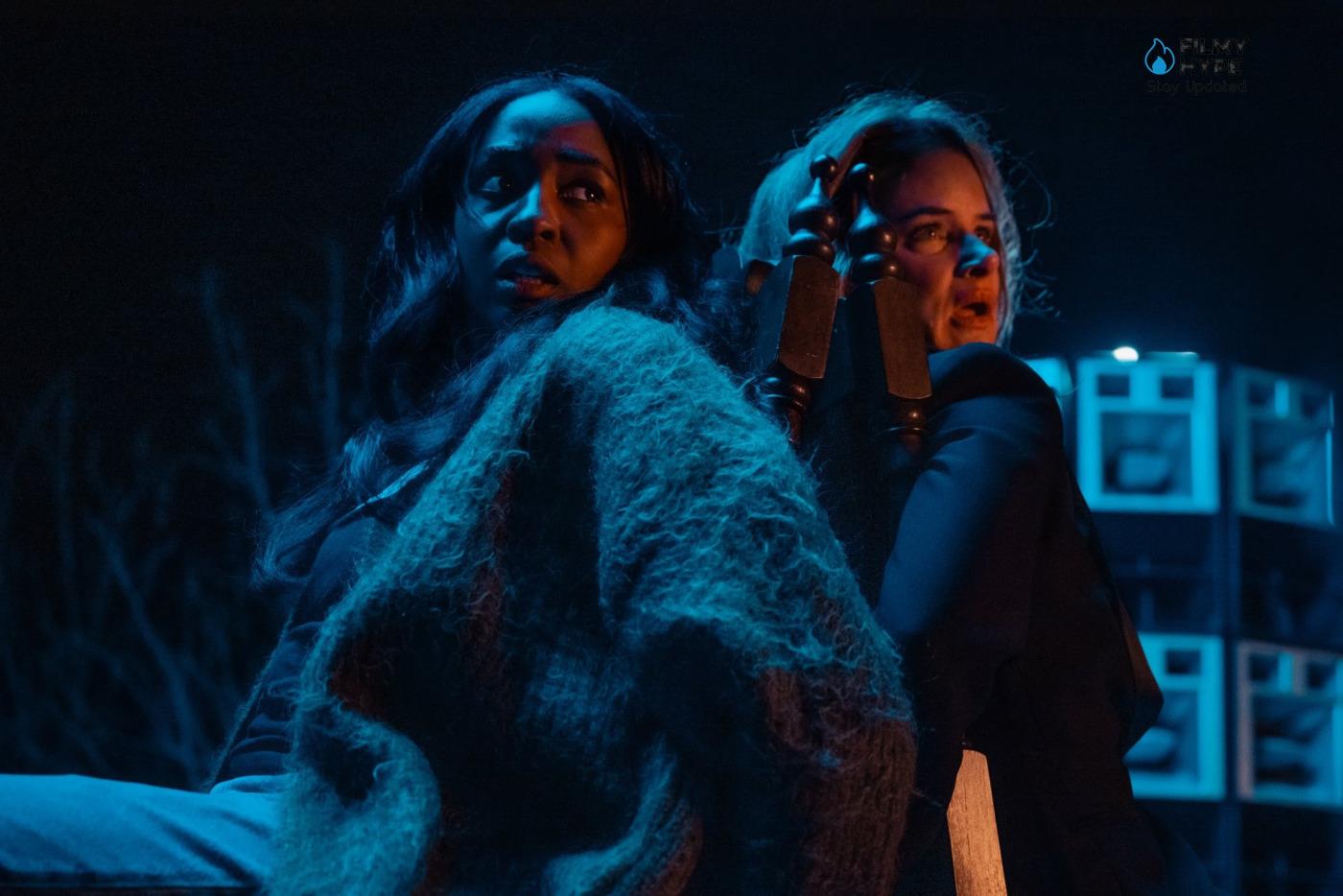
A work like Opus, therefore, had the potential to be a film that defines our current moment, but unconvinced attacks on celebrity culture are never sharp or incisive enough to get under the skin. Rather quickly, a dynamic like that of The Menu emerges, with Moretti’s faithful workers loyally doing everything they are told. No one except Ariel refuses to believe that something sinister is happening within the devoted community. Opus, however, does not care much about explaining Moretti’s motivations. There is only enough information to understand how discouraged the latter was from the way everyone in the world, from the media to fans, felt entitled to have a piece of him. As things intensify, Ariel gets stuck overall, despite all his efforts to leave; the number of corpses increases, and a game of cat and mouse begins, which wearily brings to an ending that leaves with a bitter taste in the mouth.
First of all, we can say that Opus, in contrast, does little to be original (consciously?): The pattern is enough sgamato, as well as the narrative structure in which a group of people who unwittingly find themselves in the middle of a plan designed to be fully carried. The analysis of tribalism mixed with the religious factor is therefore clear: celebrity as an idea of belief and devotion. Mark Anthony Green’s reasoning, however, does not want to aim for uniqueness to court, but tries to get into contemporary language, reflecting on the subjugating era in which the idolatry is mistaken for Faith – and vice versa – creating uncontrollable monsters. This is why Ariel’s character who, needless to say, is played by the best new voice in Hollywood (yes, Ayo Edebiri is the best that American cinema can give us right now), it is fundamental to unhinge certain concepts, aiming at that objectivity and that truth which, of course, do not belong to influencer, tasty ridiculed by Green’s gaze. A look is applied to the controversial Moretti (and it is no coincidence that it is the second director who targets them, after Tim Burton in Beetlejuice Beetlejuice), as he is the point of view of history, intertwined with that of Ariel.
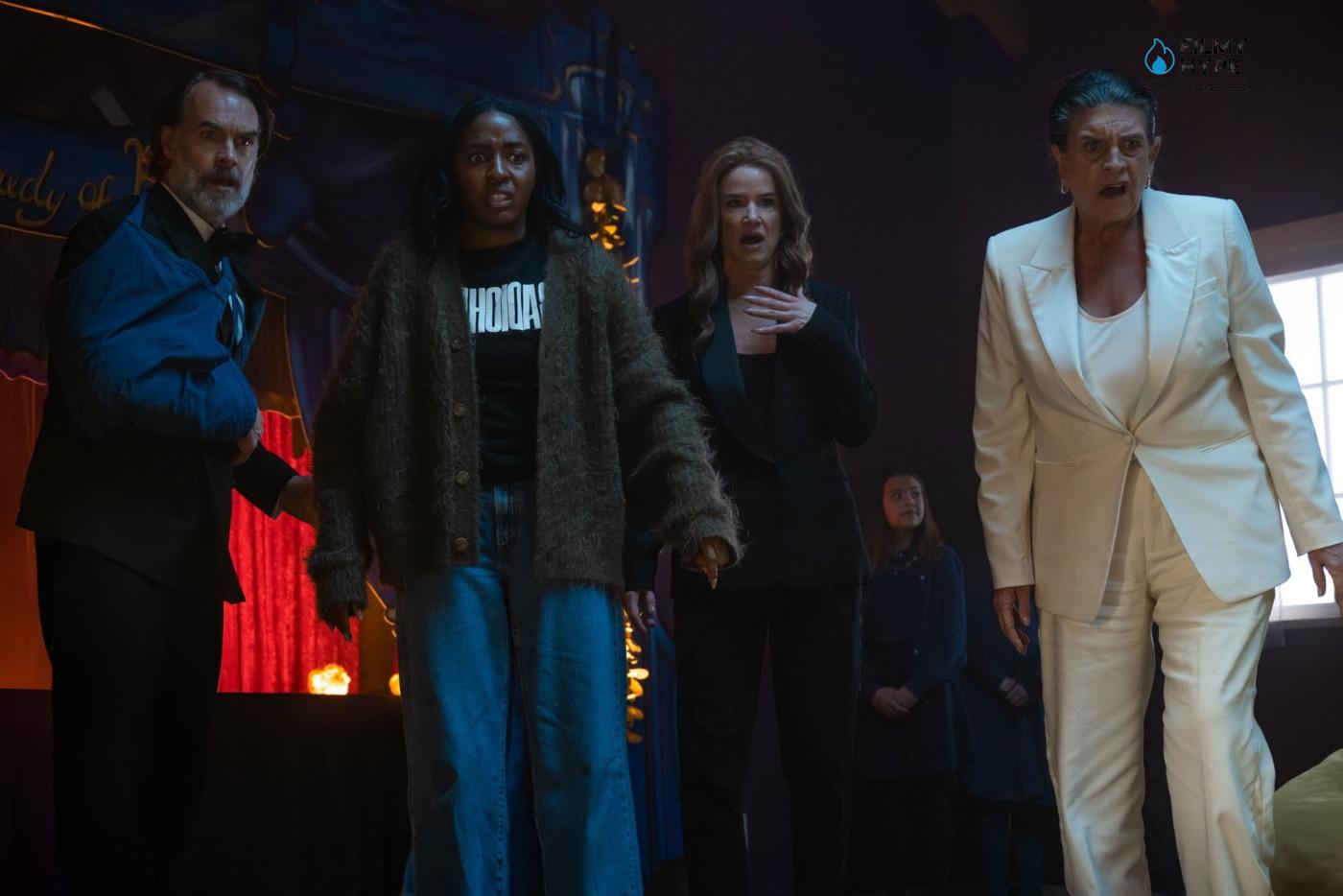
However, even though the truth itself continues Opus, it is subject to being an integral part of an artistic ideology which does not accept contrasts or criticisms, making it an instrument enslaved for its purposes, plagiarizing and infecting those who believe in false prophets (very similar to those leaders who profess and sentence). Therefore, the star Moretti, a copy-coal of himself and a stage instrument, is nothing more than a mystery revealed (and taken for granted) in a work that – like Moretti himself – lives by spasmodically pursuing the effect. Follows the sextet’s journey into the property, where obviously bizarre, surreal, and gradually more violent things happen. Ariel and the others must decide whether to cling to the possibility of a story that changes the course of their careers, perhaps risking their lives, or fleeing as long as they are on time.
Opus’ premises are intriguing, but the problem is that, unlike the films already mentioned, they seem very to themselves. Seeing a Midsommar or The Lighthouse is evident as the sui generis context of the film is used to deal with a very specific theme. The sect in Ari Aster’s film has internal consistency. It is well developed in its rules and functioning because the director focuses a lot of attention on it, using it as a narrative impact frame to talk about the mourning process. On the other hand, the Opus sect (which seems to be watching various films, from Midsommar to The Menu) collapses like a house of cards. Many ideas and fascinations are not explored or arouse curiosity in the characters that act as an intermediary to the viewer, ending up looking like poses, stylistic boutades. The relevance of the blue color, the strange rituals at the table, the pottery: all one more ever explored or contextualized, under which there is a real poverty of really strong ideas, or at least those capable of creating a distinctive atmosphere or to keep a memorable narrative on its feet. When the true goal of the sect and Moretti is revealed to us in the finale, all the allure of the film evaporates because Mark Anthony Green looks more in search of the effect revelation than of the closure of a well-developed theoretical discourse.
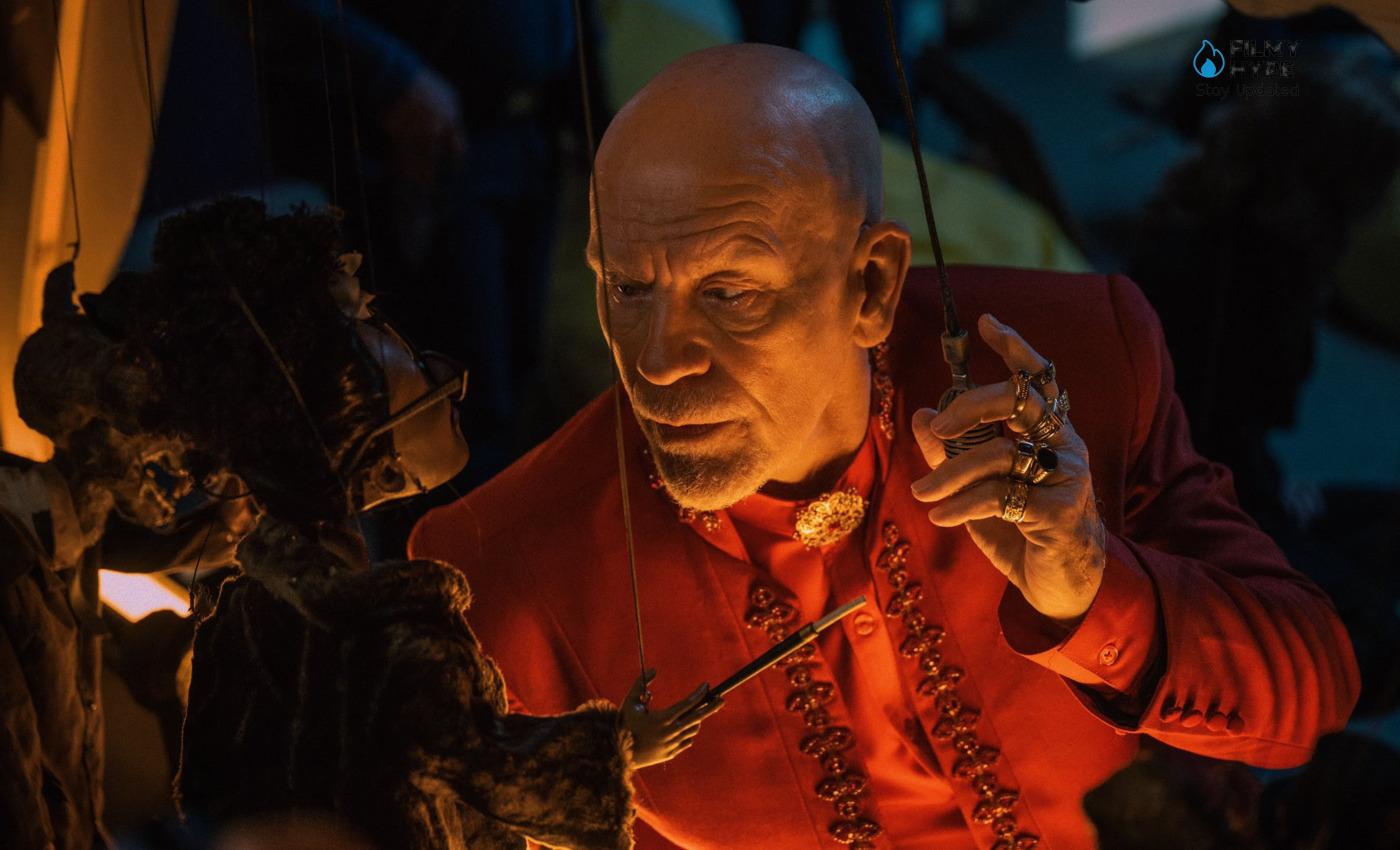
Even Moretti’s character, potentially delicious in his being as ridiculous as vain and pompous, never really comes to life, simply wearing whispers of outfits and performing bizarre actions rather than being concretely built by writing and iteration with other characters. Not to mention the songs that he plays: ugly, very ugly. Intentionally certain, but not in that way “that makes the turn” and becomes iconic, sculpted. The original songs in the film seem composed with listlessness, reinforcing the suspicion that even music is not the point of the film. Opus would then have one last card to play: his caustic story about show journalism and its ambiguous relationship with celebrity: that of the characters he tells, that of the signatures that write the articles. It is the best starting point for his hands, but this too is sacrificed to the vain search for an exit, a scene, a scratchy ending enough to enter the circle of A24 films that have left their mark.
Opus Film Review: The Last Words
Mark Anthony Green reviews the ideas related to idolatry, religion, and vanity for a psychological thriller that does not aim at originality but is more interested in playing with the constant effect, as if it were the emulation directed by the protagonist, played by John Malkovich. On the other hand, the soundtrack is fundamental, as is the presence of Ayo Edebiri, clearly the best American actress of the moment. Without revealing anything, it is precisely here that the most valid intuition of Green: the exploitation of mediocrity (and its ambitions) becomes the cornerstone of history. In some respects, it is also the demonstration of how blatantly the film is “built”, unable to hide the artificiality of its narrative solutions. The same passages composed by Nile Rodgers is The-Dream they are not very credible as the hit of the world’s largest pop star, and leave the feeling of an artifact product, with intriguing but not very elaborate ideas.
Cast: Ayo Edebiri, John Malkovich
Directed: Mark Anthony Green
Filmyhype.com Ratings: 3.5/5 (three and a half stars)







